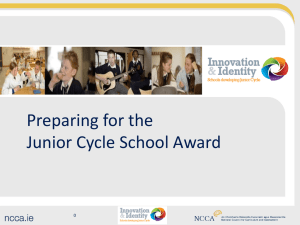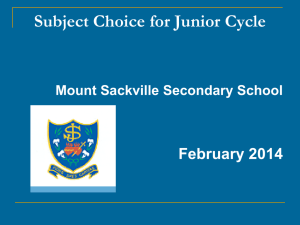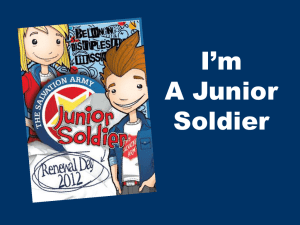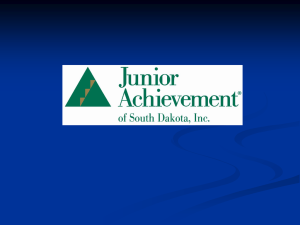Junior Cycle Reform - School Development Planning Initiative
advertisement
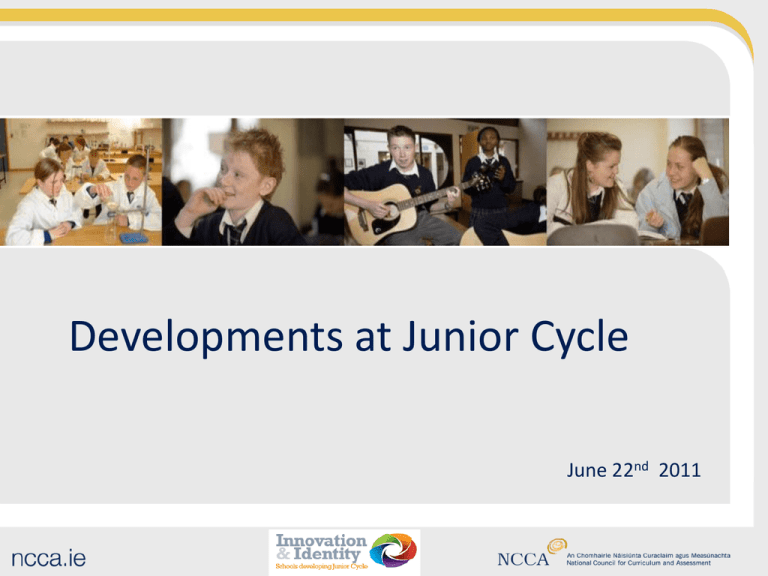
Developments at Junior Cycle June 22nd 2011 Junior Cycle Development…so far • Innovation and Identity discussion paper • Consultation findings on www.ncca.ie • Strong evidence base for change • Commitment to junior cycle reform in programme for government and by the Minister • NCCA developing a new Framework for Junior Cycle 2 Rationale for junior cycle development Minister’s request and input to Council • • • • Create the space for deeper learning and innovation in schools The forms of assessment for junior cycle and the scaling back of the Junior Certificate The role of key skills in junior cycle Continuity with primary education ESRI research on the experience of junior cycle Build on previous review and look to the future 3 How the World’s Most Improved School Systems Keep Getting Better ‘…improving systems generally spend more of their activity on improving how instruction is delivered than on changing the content of what is delivered.’ 4 How the World’s Most Improved School Systems Keep Getting Better Rather, these systems achieve improvement by the center increasing the responsibilities and flexibilities of schools and teachers to shape instructional practice – one-third of the systems in the ‘good to great’ journey and just less than two-thirds of the systems in the ‘great to excellent’ journey decentralize pedagogical rights to the middle layer (e.g. districts) or schools. McKinsey and Company November 2010 http://www.mckinsey.com/ 5 A new Framework for Junior Cycle • A new way for students to encounter junior cycle • All aspects at the service of learning and teaching • Combination of strong framework for all with local flexibility • Junior Cycle’s own identity - the engaged learner and future citizen 6 A new Framework for Junior Cycle? The focus is on... •Students making a greater connection with learning •Improving the quality of learning that takes place •Ensuring literacy, numeracy and key skills are embedded in the learning 7 A new Framework for Junior Cycle? Learning •What a student will learn described in 35 statements of essential learning across eight areas of learning •The skills of literacy and numeracy and other key skills embedded in areas of learning and the curriculum 8 Areas of learning Scientific Approach Wellbeing Arts Technology Moral and Religious Education Social Studies Mathematical Thinking Language 9 Key Skills 10 11 A new Framework for Junior Cycle? Curriculum • Subjects and short courses continue to play an important role • Schools enabled to develop some courses of their own • Curriculum specifications that are smaller and less detailed than at present Classical Studies English French German Irish Italian Spanish CSPE Geography History Jewish Studies Religious Education SUBJECTS Mathematics Science Technical Graphics Technology Materials Technology (Wood) Metalwork Business Studies Art Craft Design Home Economics Physical Education SPHE Music 13 Potential Short Courses • Cultural studies • Book club • Sustainable living and resource • Making Choices management • Personal Finance • Debating • School Musical • Write-a-book • Coaching in the community • Development Education • Being innovative-product • School musical • Leadership design • Creating an e portfolio 14 A new Framework for Junior Cycle? Assessment • Assessment playing a major part in everyday learning over the three years of junior cycle • Students being more responsible for gathering and presenting evidence of their learning • Teachers judging, giving feedback, and reporting on that evidence A new Framework for Junior Cycle? Qualifications • Two new qualifications • Smaller qualifications with fewer curriculum components, giving schools more space and time to spend on their junior cycle programme, on literacy, numeracy and key skills Leading and supporting junior cycle change • All schools heading in the same direction, to the same destination • All schools move at the same time…but not necessarily at the same pace • Clear plan and appropriate timeframe • Introducing changes on a phased basis • Developmental approach taken to working with teachers and schools • Identify the supports and resources needed 17 Leading and supporting change Preparation / engagement and thinking Year 2&3 Preparation / planning Year 4 New junior cycle starts Year 5 Second Year of new junior cycle Year 6 Third Year of new junior cycle New qualifications awarded Changing assessment arrangements/practices Year 1 18 What really matters? An entitlement curriculum which while not giving an inch on standards in literacy and numeracy is broad, balanced and rich; which engages, excites and empowers; which attends to children’s present as well as their future needs; which addresses the condition of society and the wider world; and is taught to the highest possible standard. Robin Alexander, Cambridge Primary Review 19
